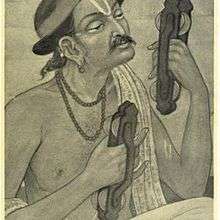Vaishnava Jana To

| "Vaishnava Jana To" | |
|---|---|
| Song by Several artists like Lata Mangeshkar Gotuvadyam Narayana Iyengar Jagjit Singh M. S. Subbulakshmi | |
| Language | Old Gujarati |
| Published | 15th century |
| Genre | Bhajan, devotional poetry |
| Songwriter(s) | Narsinh Mehta |
Vaishnava Jana To is one of the most popular Hindu bhajans, written in the 15th century by the poet Narsinh Mehta in the Gujarati language. The bhajan speaks about the life, ideals and mentality of a Vaishnava Jana (a follower of Vishnu).
Lyrics
Lyrics of the Poems:
| Gujarati | Devanagari | IAST Transliteration | Translation |
|---|---|---|---|
|
વૈષ્ણવ જન તો તેને કહિયે |
वैष्णव जन तो तेने कहिये |
vaiṣṇava jana to tene kahiye |
Call those people Vaishnavas who |
|
સકળ લોકમાં સહુને વંદે, |
सकळ लोकमां सहुने वंदे, |
sakaḷa loka māṁ sahune vande, |
They respect the entire world, |
|
સમદૃષ્ટિ ને તૃષ્ણા ત્યાગી |
समदृष्टि ने तृष्णा त्यागी, |
sama-dṛṣṭi ne tṛṣṇā tyāgī, |
They see all equally, renounce craving, |
|
મોહ માયા વ્યાપે નહિ જેને, |
मोह माया व्यापे नहि जेने, |
moha māyā vyāpe nahi jene, |
They do not succumb to worldly attachments, |
|
વણ લોભી ને કપટ રહિત છે, |
वणलोभी ने कपटरहित छे, |
vaṇa-lobhī ne kapaṭa-rahita che, |
They have forsaken greed and deceit, |
Influence
In 1999, this song was rendered in a single album by top artists such as classical vocalists Gangubai Hangal and Pandit Jasraj, pop star Remo Fernandes and also including Sarod maestro Amjad Ali Khan, Pandit Narayan on the sarangi, flute maestro Hariprasad Chaurasia and santoor exponent Shivkumar Sharma played an instrumental rendition.[1][2] Along with "Raghupati Raghava Raja Ram", the song is also sung regularly by Delhi's best known western classical choral groups — The Capital City Minstrels at their annual Peace Concerts coinciding with Gandhi Jayanti. Carnatic guitarist Baiju Dharmajan created an instrumental guitar version of the prayer in 2013.[3]
In popular culture
Elements of the hymn were included in the Hollywood film Gandhi (1982), in Bollywood films like Water (2005), Cheeni Kum (2007) and Road to Sangam (2009), and Kollywood film Hey Ram (2000). The hymn was also used as a title song for several Indian films. In the Telugu movie Prathinidhi (2014), the first stanza of the song is used during the climatic scene. In the Malayalam movie Indian Rupee (2011), the first stanza of the song is used in the climatic scene and sung by Bombay Jayashri. The song also appears in the Gujarati biopic of the author Kunvaar Bhainu Mameru.
An instrumental rendition of the song was featured in the strategy video game Sid Meier's Civilization VI as the musical theme for the Indian civilization.
Recently to commemorate Mahatma Gandhi on his 150th birth anniversary artist from 124 countries recreated this song.[4]
See also
References
- ↑ "Album on Gandhi's hymn". Tribune. Retrieved 12 March 2012.
- ↑ Nalini Natarajan; Emmanuel Sampath Nelson (1996). Handbook of Twentieth-Century Literatures of India. Greenwood Publishing Group. pp. 100–. ISBN 978-0-313-28778-7. Retrieved 10 October 2012.
- ↑ Baiju .Dharmajan (2013-08-15), Vaishnav Janato on Guitar: Baiju Dharmajan, retrieved 2018-01-28
- ↑ "Gandhi's favourite 'bhajan' goes global, artists from 124". times of india. Oct 2, 2018.